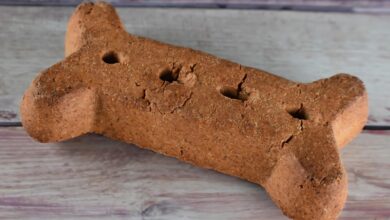The Importance of Omega-3 and Omega-6 Fatty Acids
Crucial for your Labrador’s skin, coat joints and immune system

BY BERNADETTE ROBERTS
A well-balanced diet is crucial for a dog’s overall health, and essential fatty acids play a key role in maintaining their wellbeing. Among these, Omega-3 and Omega-6 fatty acids are particularly important for maintaining healthy skin, a shiny coat, strong joints, and a robust immune system. However, the source of these fatty acids is just as important as their inclusion in a dog’s diet. Ensuring that fish-based Omega-3 is sourced from uncontaminated waters is vital to prevent exposure to harmful toxins.
The Benefits of Omega-3 Fatty Acids
Omega-3 fatty acids are polyunsaturated fats that help regulate inflammation and promote overall wellness. They are found in fish oil, krill oil, flaxseeds, and chia seeds. The three primary types of Omega-3s beneficial for dogs are:
EPA (Eicosapentaenoic Acid): Helps reduce inflammation, improving joint health and mobility, particularly in breeds prone to arthritis like Labradors and Retrievers.
DHA (Docosahexaenoic Acid): Supports brain development in puppies and maintains cognitive function in senior dogs.
ALA (Alpha-Linolenic Acid): Found in plant-based sources but must be converted into EPA and DHA to be beneficial, making marine sources superior.
Health Benefits of Omega-3 for Dogs:
Reduces joint inflammation – Beneficial for senior dogs or those with arthritis.
Supports heart health – Lowers blood pressure and promotes circulation.
Improves brain function – Enhances memory and learning, especially in puppies and aging dogs.
Promotes a healthy coat and skin – Helps combat dry, itchy skin and reduces shedding.
Boosts immune system – Protects against infections and supports overall health.
The Role of Omega-6 Fatty Acids
Omega-6 fatty acids are also essential in a dog’s diet and are primarily found in poultry fat, sunflower oil, and safflower oil. Unlike Omega-3s, which have anti-inflammatory properties, Omega-6s help promote skin regeneration, energy production, and healthy growth.
Health Benefits of Omega-6 for Dogs:
Encourages healthy skin and coat – Prevents dryness and promotes a glossy coat.
Supports cell function and repair – Aids in proper cell membrane function.
Provides energy – Helps maintain metabolism and energy levels.
Supports reproductive health – Beneficial for pregnant and nursing dogs.
Why the Source of Fish Matters
While fish oil is an excellent source of Omega-3, it is crucial to ensure that it comes from clean, uncontaminated waters. Fish from polluted waters may contain heavy metals, PCBs (polychlorinated biphenyls), and other toxins that can harm your dog’s health over time.
Safe Fish Sourcing Tips:
Opt for wild-caught fish – Fish from cold, clean waters (like those from Norway or Alaska) have lower contamination risks.
Choose small fish species – Sardines, anchovies, and mackerel are less likely to accumulate toxins compared to larger fish like tuna.
Look for third-party testing – High-quality fish oil brands provide purity certifications to ensure their products are free from contaminants.
Consider krill oil – Krill is a sustainable and low-toxin alternative to fish oil, providing high levels of bioavailable Omega-3s.
Ensuring your dog gets the right balance of Omega-3 and Omega-6 fatty acids is essential for their skin, coat, joints, brain function, and immune system. However, always prioritize sourcing high-quality fish oils from clean waters to avoid contaminants that could do more harm than good.
If you’re considering adding Omega supplements to your dog’s diet, consult your veterinarian for the best options suited to your pet’s breed, age, and health needs. By prioritizing clean and nutritious sources, you’re giving your dog the best chance at a long, healthy life.






